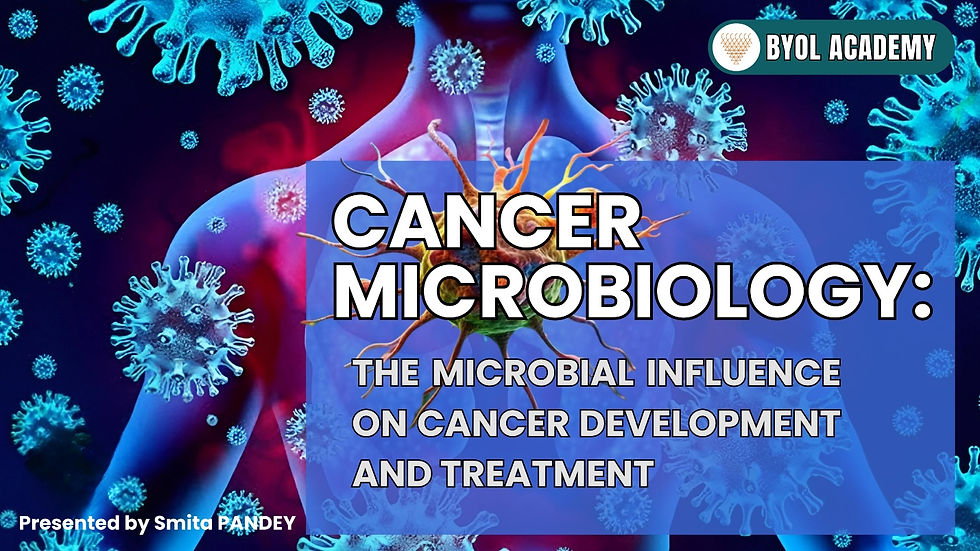
“Your support today could save a life Tomorrow”.
ONE WORLD, ONE GOAL-
United against cancer.
Theme of this year- “UNITED BY UNIQUE”, which emphasizes the importance of personalized, people- centered care in the fight against cancer.
In the intricate dance of life, there is an unseen world thriving within us- A vast universe of Trillion of microorganism. While most people think of bacteria, fungi and viruses as mere culprit of illness, emerging cancer research is uncovering a surprising reality: these tiny microbes may hold the key to unlocking the mysteries of cancer itself.
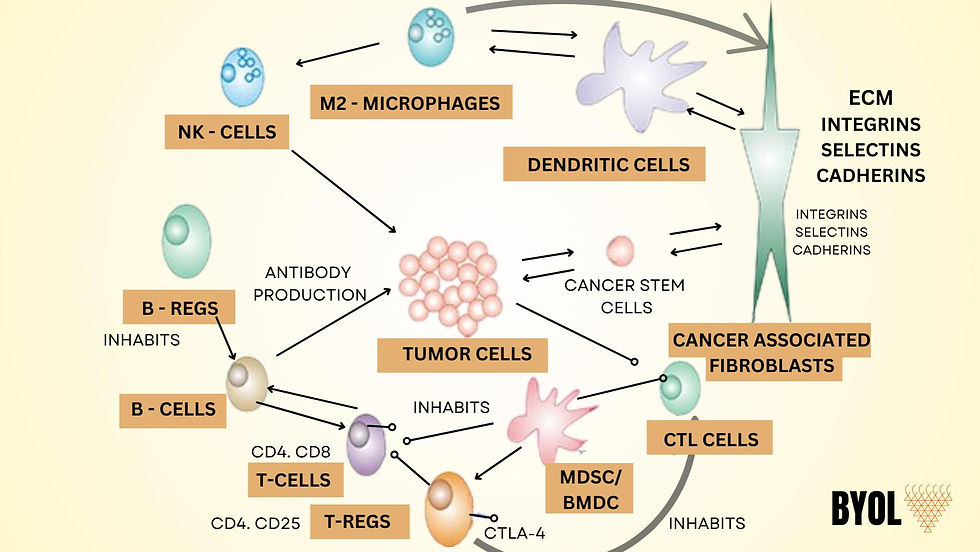
What if cancer, a disease notorious for its unstoppable spread, could be influenced by the balance of the invisible organisms living within us? These microbes might not just be passive bystanders—they could be playing a role in either fueling tumor growth or offering a new way to fight it. This emerging field of cancer microbiology is uncovering surprising links between our microbiome and cancer, with the potential to reshape how we Diagnose, Treat, and even Prevent the Disease.
Microorganisms, often seen as mere agents of disease, may hold secrets to understanding cancer’s hidden mechanisms. Research reveals that microbes are involved in about 15% of cancers, particularly in developing regions. While gut bacteria have long been studied for their link to cancer, emerging evidence shows that microbes in tumor environments could revolutionize diagnosis, prognosis, and treatment. As science delves deeper, the role of these tiny organisms in both fostering and fighting cancer becomes increasingly clear.
Role of Microorganisms in Cancer Development-
Research reveals that microbial infections can drive cancer by causing chronic inflammation, damaging DNA, and altering immune responses. Notable examples include:

A. Bacterial Influence on Cancer-
Certain bacteria have been implicated in cancer initiation and progression, mainly by producing toxin, inducing Oxidative stress, and impairing immune surveillance.
Helicobacter pylori (H. pylori): This bacterium infects the lining of the stomach and closely linked to gastric cancer. It activates persistent inflammation, that damage DNA and leads to uncontrolled cell growth.
Escherichia coli (E. coli): Some strains release toxins that facilitate genomic instability and contribute to colorectal cancer.
Fusobacterium nucleatum: This bacteria, found in colorectal cancer tissues, may boost tumor growth by suppressing the immune response.
B. Viral Influence on Cancer-
Certain viruses are directly linked to cancer through genetic integration and disruption of cellular processes.
Human Papillomavirus (HPV): A leading cause of cervical, anal, and oropharyngeal cancer. It interferes with tumor suppressor genes, resulting in uncontrolled cell growth.
Hepatitis B and C Viruses (HBV, HCV): These viruses cause chronic liver infections that can result in liver cancer (hepatocellular carcinoma) by promoting fibrosis and cirrhosis.
Epstein-Barr Virus (EBV): Associated with nasopharyngeal carcinoma and certain lymphomas by altering immune responses and cell proliferation.
C. Fungal Influence on Cancer-
Emerging evidence shows that fungal overgrowth, like Candida, may contribute to cancer by producing toxins and inflammation, weakening the immune system and aiding tumor development.
D. Parasite influence on cancer-
Parasites like liver flukes, blood flukes, Clonorchis sinensis, and Toxoplasma gondii are linked to cancers such as liver, bladder, and brain cancer. These widespread parasites disrupt cellular processes, emphasizing the need for global efforts to address parasitic infections in cancer prevention.
Gut Microbiome and Cancer
The Gut Microbiome, made up of Trillions of Microorganisms, a Cornerstone of good health, including the Prevention and Progression of Cancer. When the balance between beneficial and harmful bacteria is disrupted, a condition known as Dysbiosis, it can contribute to:
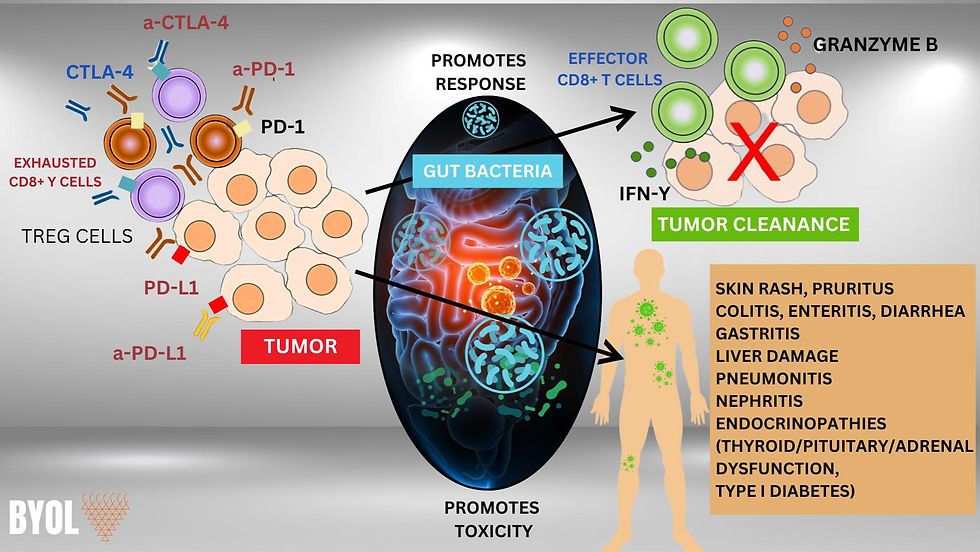
Chronic inflammation: Certain gut bacteria produce pro-inflammatory compounds that can lead to DNA damage and Tumor formation.
Altered metabolism: Microbial metabolism of Dietary components can generate carcinogenic compounds.
Immune modulation: A balanced Microbiome enhances immune function, whereas dysbiosis may suppress it, allowing cancer cells to thrive.
Key Gut Microbes Linked to Cancer Risk:
Across the globe, the delicate balance between Beneficial and Harmful gut bacteria is crucial in shaping cancer risks. That includes -
Beneficial Bacteria: Lactobacillus and Bifidobacterium boost the immune system and keeps harmful microbes in check.
Harmful bacteria: Clostridium species make toxin that can damage intestinal cell and may cause colorectal cancer.
Unraveling the impact of these microbes paves the way for innovative approaches to cancer prevention and treatment worldwide.
Role of Microbiota in Cancer Therapy-
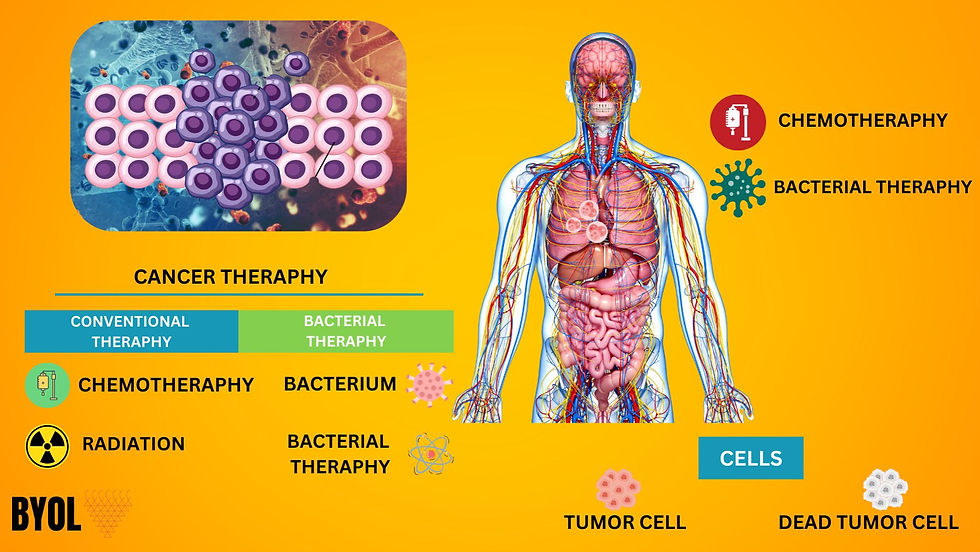
The microbiome also influences cancer treatment outcomes, particularly in areas such as:
A. Immunotherapy and the Microbiome
Recent studies suggest that gut microbiota composition affects the efficacy of cancer immunotherapies, such as immune checkpoint inhibitors (ICIs), such as PD-1/PD-L1 and CTLA-4 inhibitors, work by unleashing the immune system to recognize and attack cancer cells.
Specific gut bacteria, such as Akkermansia muciniphila and Bifidobacterium, have been linked to improved responses to ICIs. These beneficial microbes enhance antigen presentation, promote T-cell activation, and reduce immune suppression within the tumor microenvironment.
B. Chemotherapy and Microbial Interaction

The gut microbiome significantly impacts chemotherapy by influencing drug efficacy and toxicity.
1. Microbial Drug Metabolism:
Certain gut bacteria, like Escherichia coli and Clostridium species, can metabolize chemotherapy drugs, potentially reducing their effectiveness or producing toxic byproducts that worsen side effects such as diarrhea and mucositis.
2. Gut Protection Strategies:
Strategies like probiotics, prebiotics, and targeted antibiotics are being explored to optimize gut health and improve chemotherapy outcomes. Identifying microbial markers linked to drug resistance may help personalize treatment plans.
Modulating the gut microbiome holds promise for enhancing chemotherapy effectiveness while minimizing harmful side effects.
C. Radiation Therapy and Microbiome Health
Radiation therapy can disrupt gut microbiota, causing side effects like diarrhea, inflammation, and mucosal damage.
1.Microbiota Disruption by Radiation: Radiation damages the gut lining, reducing beneficial bacteria and allowing harmful pathogens to thrive, leading to conditions like radiation enteritis and increased inflammation.
2.Restoring Microbial Balance: Strategies such as probiotics, fiber-rich diets, and fecal microbiota transplantation (FMT) help replenish beneficial bacteria, reduce inflammation, and improve gut resilience post-radiation.
Maintaining a balanced microbiome is crucial to enhancing treatment outcomes and minimizing radiation-related complications.
Strategies to Improve Microbiome Health for Cancer Prevention and Treatment-
Maintaining a healthy microbiome can reduce cancer risk and enhance treatment effectiveness. Some strategies include:
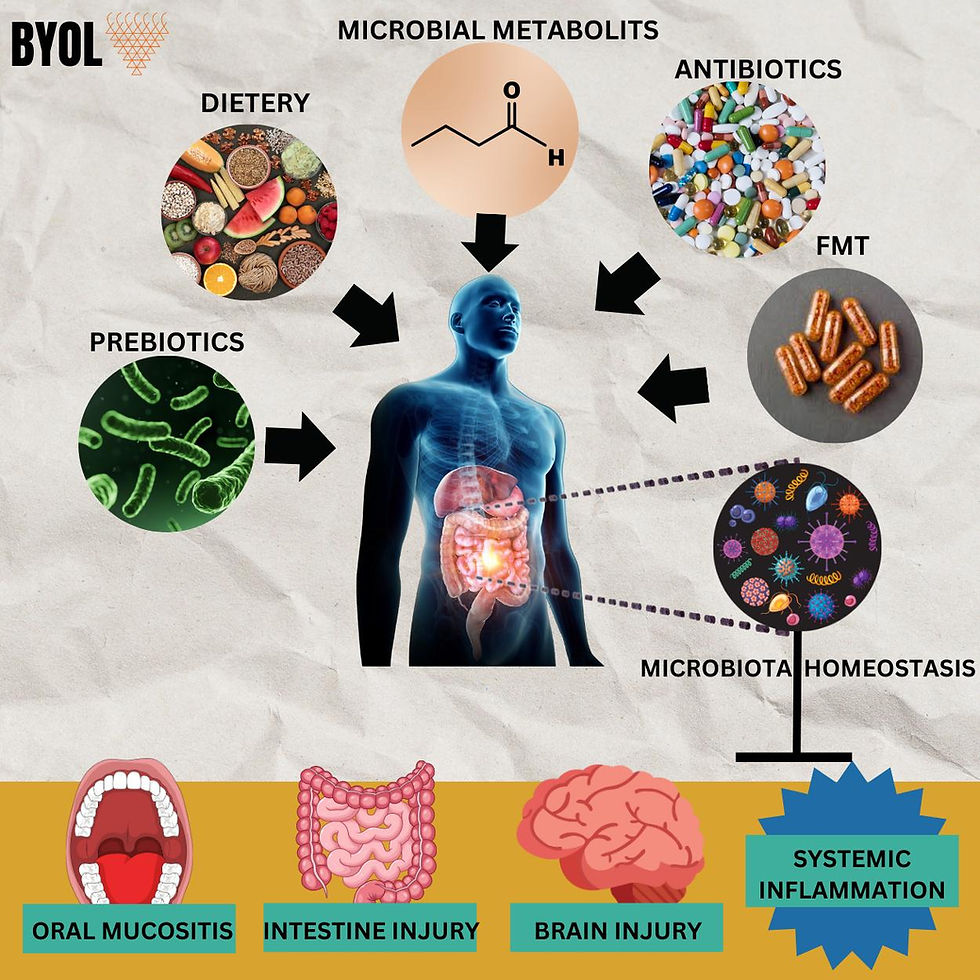
A. Diet and Lifestyle Modifications
Prebiotic foods: Promote the growth of Beneficial bacteria (e.g., fiber-rich foods like garlic, onions, and bananas).
Probiotic foods: Introduce Beneficial bacteria (e.g., yogurt, kefir, and fermented foods).
Limit processed foods and sugar: These can encourage the growth of harmful bacteria linked to inflammation and cancer.
Regular exercise and stress management: Support Gut Health and Immune function.
B. Fecal Microbiota Transplantation (FMT)-
Used to restore microbial balance in patients with severe dysbiosis, potentially improving immune function and response to cancer treatments.
Fecal Microbiota Transplantation (FMT) is an innovative treatment where stool from a healthy donor is transplanted into a patient’s gastrointestinal system. This procedure helps restore a balanced microbiome, particularly in cases of infections like Clostridium difficile, which disrupts the gut’s natural bacteria. FMT has shown effectiveness in treating gut-related conditions and is being explored for its potential to treat diseases such as inflammatory bowel disease (IBD) and even metabolic and neurological disorders. While promising, FMT is still being researched to understand its broader clinical applications.
Challenges and Future Directions in Cancer Microbiology
The future of cancer treatment is shifting toward a more personalized and precise approach, where the tiny microbes in our bodies could play a key role. Scientists are using advanced technologies like AI and genetic research to decode the complex relationship between cancer and the microbiome. By fine-tuning these microbial communities, they hope to enhance treatments and even prevent cancer before it starts. Non-invasive tests, targeted therapies, and long-term studies will help shape this new era, bringing us closer to smarter, more effective ways to fight cancer.

Key Future Research Areas Include:
Personalized Microbiome-Based Therapies: Tailoring treatments to individual microbiome profiles for better outcomes.
Microbial Biomarkers for Early Detection: Developing non-invasive diagnostic tools using microbial signatures for early cancer detection.
Microbiome-Immune Interactions: Enhancing immunotherapy by understanding how microbiota influences immune responses.
Impact on Treatment Response: Investigating microbiota's role in improving chemotherapy and radiotherapy efficacy.
Microbial Metabolites: Exploring bioactive compounds produced by microbes for potential anti-cancer properties.

Fecal Microbiota Transplantation (FMT): Using FMT to restore microbial balance and enhance treatment responses.
Targeted microbial therapies – Developing drugs that manipulate the microbiome to fight cancer.
Dietary Influence on Cancer Risk: Examining how diet affects the microbiome’s role in cancer.
Global Collaboration: Promoting international research to standardize microbiome-based cancer interventions.
Longitudinal Studies: Tracking microbiome changes over time to predict cancer risk and progression.
You are braver than you believe, Stronger than you seem, smarter than you think and twice as beautiful as you’d ever imagined. Don’t let cancer cause you to sell yourself short or forget your worth.
Conclusion-
Cancer microbiology looks at how tiny microorganisms in our bodies can influence cancer. Some microbes may contribute to cancer growth, while others might help prevent or even treat it. By studying these interactions, researchers are developing new ways to stop cancer before it starts and create personalized treatments. Ongoing research into the microbiome—our body's community of microorganisms—is opening exciting possibilities, offering hope for better cancer prevention and care in the future.
The fight against cancer is entering a new Era—one where the tiniest organisms inside us could become powerful allies. Instead of relying only on chemotherapy or surgery, scientists are uncovering how our own microbes might help prevent, control, or even treat cancer. As we explore this hidden world, the future of cancer treatment is taking shape in ways we never imagined, opening doors to groundbreaking possibilities.
References:
Goodrich JK, Di Rienzi SC, Poole AC, Koren O, Walters WA et al. Conducting a microbiome study. Cell 2014; 158:250–262 [View Article] [PubMed]
2.Ryan RM, Green J, Lewis CE. Use of bacteria in anti-cancer therapies. Bioessays 2006; 28:84–94 [View Article] [PubMed]
3.StJean AT, Zhang MM, Forbes NS. Bacterial therapies: completing the cancer treatment toolbox. Curr Opin Biotechnol 2008; 19:511–517 [View Article] [PubMed]
4.Center MM, Jemal A, Ward E. International trends in colorectal cancer incidence rates. Cancer Epidemiol Biomarkers Prev 2009; 18:1688–1694 [View Article] [PubMed]
5.de Martel C, Georges D, Bray F, et al. Global burden of cancer attributable to infections in 2018: a worldwide incidence analysis. Lancet Glob Health. 2020;8(2):e180–e190. [DOI] [PubMed] [Google Scholar]
6.Nakatsu G, Li X, Zhou H, et al. Gut mucosal microbiome across stages of colorectal carcinogenesis. Nat Commun. 2015;6:8727. [DOI] [PMC free article] [PubMed] [Google Scholar]
7.Yu LX, Schwabe RF. The gut microbiome and liver cancer: mechanisms and clinical translation. Nat Rev Gastroenterol Hepatol. 2017;14(9):527–539. [DOI] [PMC free article] [PubMed] [Google Scholar]


Much needed knowledge about cancer...nice efforts.